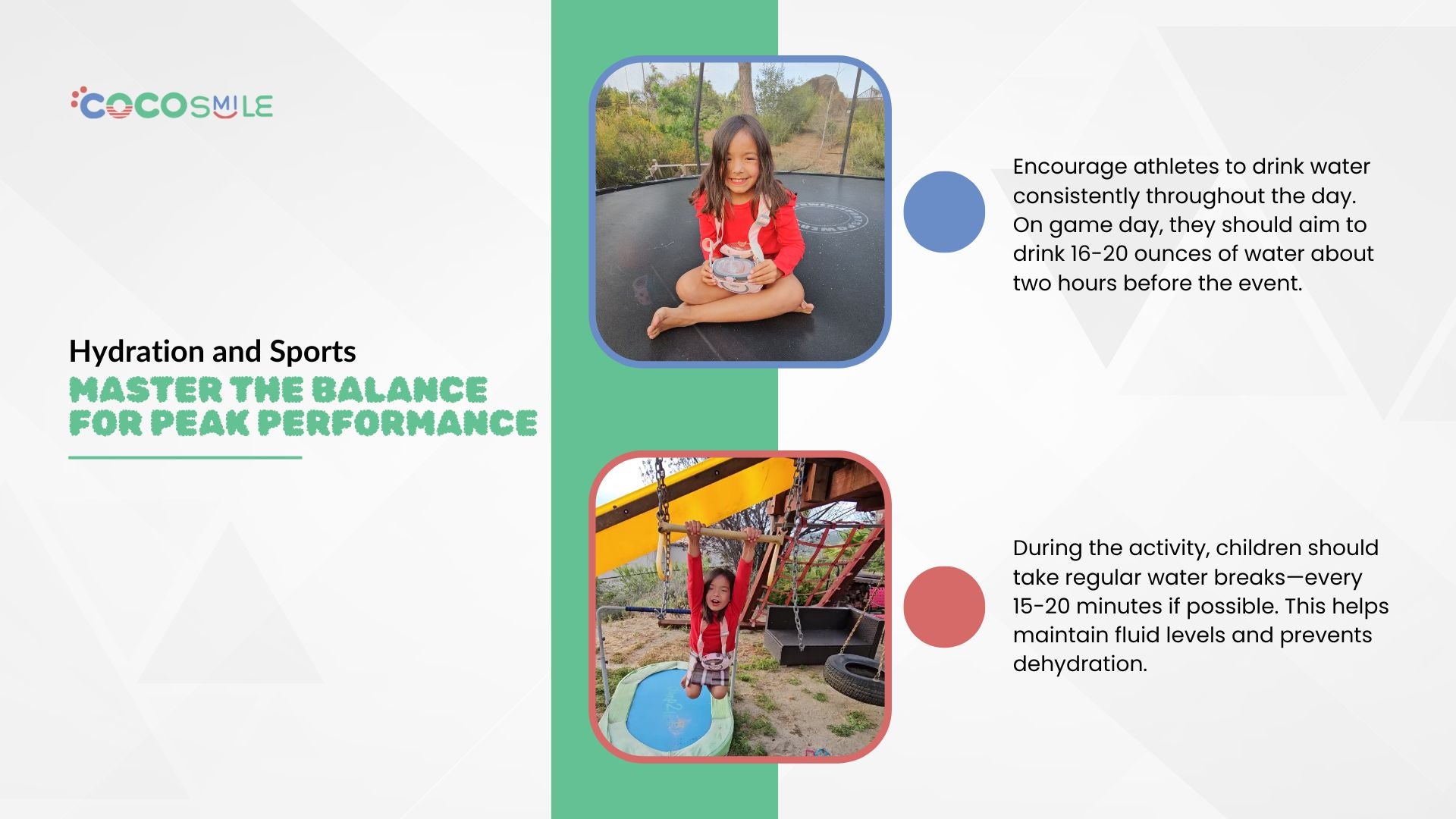"Hydration: The Secret Ingredient for Peak Performance!"
Proper hydration is the cornerstone of athletic success, influencing everything from muscle function to mental clarity during competition. For young athletes, staying hydrated is not just about quenching thirst; it's about optimizing their health and performance on the field.
This article will:
- Explore the critical role of hydration
- Teach you how to recognize signs of dehydration
- Explain how to avoid the pitfalls of over-hydration
Importance of Hydration for Young Athletes
Proper hydration is key to athletic success. It directly impacts muscle performance, stamina, and overall energy levels. When children are adequately hydrated, they can perform at their best, both physically and mentally. Dehydration, on the other hand, can lead to fatigue, dizziness, and a drop in performance.
Hydration and Athletic Performance
Hydration is vital for maintaining muscle function and circulation during exercise. A well-hydrated body ensures that nutrients reach muscles efficiently, helping to sustain energy levels and endurance. Studies show that even mild dehydration can impair athletic performance, reducing endurance by as much as 30%.
Daily Fluid Needs for Young Athletes
The amount of water young athletes need varies based on their age, size, and activity level. However, a general rule is to drink at least half their body weight in ounces of water daily. For example, a 60-pound child should aim for at least 30 ounces of water each day. During intense activities, this amount should increase. Sports dietitians recommend regular hydration breaks during practices and games to maintain optimal fluid levels.
Recognizing and Addressing Dehydration
Dehydration is a common risk for young athletes. It can develop quickly, especially in hot or humid conditions, leading to severe health issues if not addressed. Recognizing early signs of dehydration and knowing how to respond is crucial.
Signs of Dehydration in Young Athletes
Common signs of dehydration include dry mouth, dark yellow urine, headaches, and dizziness. If dehydration progresses, it can lead to more severe symptoms like nausea, vomiting, and confusion. Coaches and parents should be vigilant, especially during summer sports, where the risk is higher.
Immediate Actions if Dehydration is Suspected
If dehydration is suspected, the first step is to stop the activity and cool down the athlete. Offer small sips of water or a sports drink to help replenish fluids gradually. Encourage rest in a shaded or cool area. Knowing how to prevent dehydration is crucial for keeping young athletes safe. Educate them on the importance of drinking water regularly, especially before feeling thirsty.
Hydration Strategies Before, During, and After Sports
A solid hydration strategy is essential for young athletes. Proper hydration doesn’t just start when the whistle blows; it begins hours or even days before the activity and continues through to the recovery phase.
Pre-Activity Hydration
Begin hydrating at least 24 hours before any intense physical activity. Encourage athletes to drink water consistently throughout the day. On game day, they should aim to drink 16-20 ounces of water about two hours before the event. Foods high in water content, like oranges and cucumbers, can also contribute to hydration.
During-Activity Hydration
During the activity, children should take regular water breaks—every 15-20 minutes if possible. This helps maintain fluid levels and prevents dehydration. While Cocosmilecups make hydration fun with their kid-friendly designs, remind athletes not to gulp large amounts at once, as this can lead to discomfort or even hyper hydration.
Post-Activity Rehydration
After exercise, focus on rehydrating with water and electrolyte-rich drinks. This helps replenish fluids lost through sweat and supports muscle recovery. Salted snacks like pretzels can aid in restoring sodium levels, which is especially important after long or intense sessions.
Understanding Hyper Hydration and Hyponatremia
While dehydration is a major concern, overhydration is also dangerous. Drinking too much water can dilute the body’s sodium levels, leading to hyponatremia, a potentially life-threatening condition.
What is Hyper Hydration?
Hyper hydration occurs when someone drinks excessive amounts of water, leading to an imbalance in the body's electrolytes. This can cause cells to swell and disrupt normal bodily functions. Athletes, especially those in endurance sports, are at higher risk if they over hydrate before or during an event.
Symptoms and Risks of Overhydration
Symptoms of hyper hydration can be mistaken for heat illness and include confusion, nausea, muscle cramps, and headaches. If untreated, it can lead to kidney failure and severe health consequences. It's important to understand how to prevent dehydration while avoiding over-hydration.
How to Prevent Hyper Hydration
To prevent hyper hydration, athletes should drink according to their thirst and monitor their urine color. A pale yellow color indicates healthy hydration. Avoid forcing children to drink excessive amounts of water, especially right before an event. If there are concerns about hydration, consult a coach or sports medicine expert for advice on balanced fluid intake.
Conclusion
Proper hydration is essential for young athletes to stay healthy and perform at their best. By understanding the importance of hydration, recognizing the signs of dehydration, and preventing hyper hydration, parents and coaches can ensure their athletes remain safe and competitive. Regular monitoring and a balanced approach to fluid intake are key to success on and off the field.
FAQs
What are the best ways to keep young athletes hydrated during sports activities?
Ensure they drink 12-18 ounces of water about 30 minutes before starting. During activity, they should drink 5-9 ounces every 15-20 minutes. Also, include water-rich fruits like watermelon in their diet for added hydration.
How can I tell if my child is dehydrated during or after sports?
Signs of dehydration include dark urine, tiredness, dizziness, and stomachaches. If you notice these symptoms, get them to drink fluids and rest. If severe symptoms like confusion or vomiting occur, seek medical attention immediately.
Are sports drinks necessary for young athletes?
Sports drinks are not typically needed for short or moderate activities. For exercise lasting over an hour, a low-sugar sports drink can help replenish lost electrolytes. Generally, water is sufficient for hydration.
How often should my child take hydration breaks during sports?
They should take hydration breaks every 15-20 minutes during activity. Regular fluid intake helps maintain hydration levels and supports optimal performance and recovery.


Share:
Essential Guide to Preventing and Managing Dehydration in Children
Why Hydration Matters: Key Benefits for Kids’ Health and Success